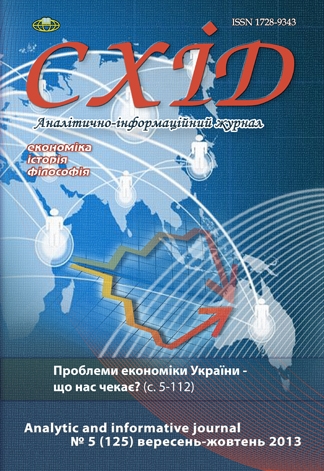Typology of rationality
DOI:
https://doi.org/10.21847/1728-9343.2013.5(125).19109Keywords:
science, subject and object of cognition, rationality, typology of scientific rationality, beyond-scienctific knowledgeAbstract
The article tells about the philosophical analyze of rationality. Traditionally several main types of scientific rationality are distinguished: classical scientific rationality, non-classical scientific rationality, and also post-non-classical types of scientific rationality. The classical type of scientific rationality concentrates the whole attitude exclusively on the object of scientific cognition only. For non-classical scientific rationality the most characteristic is the idea that the object of scientific cognition is correlated with the means and operations of cognitive activities. Post-non-classical scientific rationality is realized by philosophers mainly as taking into account the correlation of knowledge about the object of scientific cognition not only with the means of cognitive activities but also with all value-target structures of cognitive activities.
In the twentieth century many philosophers began to realize slowly that there shouldn't be only one possible rationality but there can be and even should exist absolutely different types of rationality. Moreover, only in the twentieth century philosophers were able to understand to the full extent that even the nature rationality couldn't be unchangeable forever, that is the same. The nature of rationality couldn't be without changes that absolutely stable. In contemporary social consciousness the most serious grounds for study and analyses of present contradictions between scientific and social types of rationality can be the connection of every scientific rationality with production of such important global risks which are very dangerous for the whole contemporary civilization and which it experiences rather often in complicated way (the well-known examples are Chornobyl, Fukushima, Costa Concordia etc.).
Downloads
References
Башляр Г. Новый рационализм : [пер. с франц.] / Г. Башляр - М.: Прогресс, 1987. - С.124.
Автономова Н.С. Рассудок. Разум. Рациональность : [монография] / Н.С.Автономова. - М.: Наука, 1988. - 287 с.
Xюбнер К. Критика научного разума : [пер. с нем.] / Курт Xюбнер. - М., 1994. - 326 с.
Роулз Дж. Теория справедливости : [пер. с англ.] / Дж. Роулз. - Новосибирск: Изд-во НГУ, 1995.
Чорноморденко І. В. Позанаукові знання і культуротворчий процес: [Монографія] / І. В. Чорноморденко. - К.: КНУБА, 2010. - 360 с.
Чорноморденко І. В. Проблема існування знання за межами науки: [Монографія] / І. В. Чорноморденко. - К.: КНУБА, 2005. - 306 с.
Загрійчук І. Д. Духовна культура: проблема самовизначення / І. Д. Загрійчук // Схід. - 2009. - № 4. - С.105-108.
Логика социальных наук: Адорно против Поппера // Вопросы философии. - 1992. - № 10.-С. 60-76.
Касавин И. Т. Типология чтения. (К типологии текстов и текстовых епох) / И. Т. Касавин // Философия науки. - 2006. - С. 253.
Ракитов А. И. Информационная революция : [монография] /А. И. Ракитов. - М., 1992. - 340с.
Пружинин Б. И. Рациональность и историческое единство научного знания: (Гносеологический аспект) : [монография] / Б. И. Пружинин. - М. : Наука, 1986.
Попович М. Бути людиною : [Монографія] / Мирослав Попович. - К.: Видавничий дім "Києво-Могилянська академія", 2011. - 223 с.
Попович М.В. Раціональність і виміри людського буття : [Монографія] / Мирослав Попович.- К., 1997.
Белокобыльский А.В. Основания и стратегии рациональности Модерна : [Монография] / А.В.Белокобыльский. - К.: Вид. ПАРАПАН, 2008. - 244 с.
Додонова В.І. Постнекласичний дискурс соціальної раціональності : [Монографія] / В. Додонова. - Донецьк: Вид-во ДонНУ, 2011. - 340 с.
Булатов М.О. Філософський словник / М.О. Булатов. - Київ: Стилос, 2009. - С. 421.
Мінаков М.А. Історія поняття досвіду: [Монографія] / М.А. Мінаков. - Київ: ПАРАПАН, 2007. - 380 с.
REFERENCES
Bashlyar G. (1987), The New Scientific Spirit, Beacon Press, Boston, 1985 (eng).
Avtonomova N.S. (1988), Sanity. Mind. Rationality, Nauka, Moskow, 287 p. (rus).
Hubner Kurt (1978), Kritik der wissenschaftlichen Vernunft, Freiburg/Munchen, Verlag Karl Alber, 1978 (deuth).
Rawls John (1971), A Theory of Justice (Original ed.), Belknap Press of Harvard University Press, Cambridge (eng).
Chornomordenko І. V. (2010), Non-scientific knowledge and culture-process, KNUBA, Kyiv, 360 p. (ukr).
Chornomordenko І. V. (2005), The problem of the existence of knowledge beyond science, KNUBA, Kyiv, 306 p. (ukr).
Zagrіychuk І. D. (2009), Skhіd, № 4, pp.105-108 (ukr).
The logic of the social sciences: Adorno against Popper (1992), Voprosy filosofii, 10, рр. 60-76 (rus).
Kasavin I. T. (2006), Filosofiya nauki, р. 253 (rus).
Rakitov A. I. (1992), The information revolution, Nauka, Moskow, 340 p. (rus).
Pruzhinin B. I. (1986), Rationality and historical unity of scientific knowledge (epistemological aspect), Nauka, Moskow (rus).
Popovich M. (2011), Be a Man, Publ.: «Kiєvo-Mogilyan’ka akademіya», Kyiv, 223 p. (ukr).
Popovich M.V. (1997), Rationality and dimensions of human existence, Kyiv (ukr).
Belokobylskiy A.V. (2008), Reasons and rationality of Modernity strategy, PARAPAN, Kyiv, 244 p. (rus).
Dodonova V.І. (2011), Postnonclassical discourse of social rationality, Donetsk State National University, Donetsk, 340 p. (ukr).
Bulatov M.O. (2009), Philosophical Dictionary, Stilos, Kyiv, p. 421 (ukr).
Mіnakov M.A. (2007), The history of the concept of experience, PARAPAN, Kyiv, 380 p. (ukr).
Downloads
Published
How to Cite
Issue
Section
License
Copyright (c) 2013 Ivan Chornomordenko, Ivan Zahriychuk

This work is licensed under a Creative Commons Attribution-NonCommercial-NoDerivatives 4.0 International License.
1. Authors bear responsibility for the accuracy of facts, quotations, numbers and names used.
2. Manuscripts are not sent back.
3. The publisher does not always agree with the authors' opinion.
4. The authors reserve the right to authorship of the work and pass the first publication right of this work to the journal under the terms of a Creative Commons Attribution-NonCommercial-NoDerivatives 4.0 International License. This license allows others to distribute (copy) the published work for non-commercial purposes, provided there is mandatory attribution to its authors and a link to the first publication in our journal.
5. The authors have the right to conclude separate supplement agreements that relate to non-exclusive work distribution in the form in which it has been published by the journal (for example, to upload the work to the online storage of the journal or publish it as part of a monograph), provided that the reference to the first publication of the work in this journal is included.

